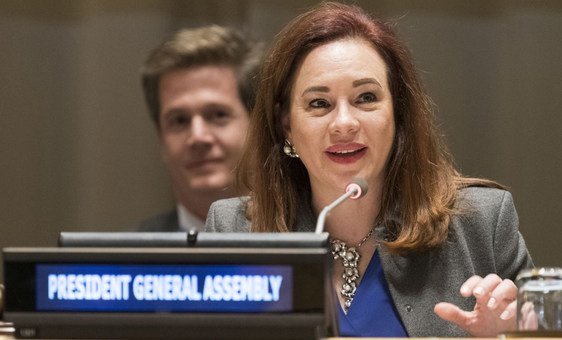Leadership of Women Crucial to UN’s Reinvention at 80, Says Former Assembly President
Political correspondent specializing in government policy, elections, and legislative affairs

As the United Nations marks its 80th anniversary, the organization is witnessing a significant milestone with the inauguration of Germany’s Annalena Baerbock as the first European woman to serve as President of the General Assembly. This historic moment shines a spotlight on the crucial role of female leadership within the UN, particularly during a period of profound structural transformation.
Annalena Baerbock’s ascent to the presidency marks only the fifth time in the UN's history that a woman has held this prestigious position. On the eve of her inauguration, María Fernanda Espinosa, a former President of the General Assembly and the first woman from Latin America and the Caribbean to hold the position, shared insights into the demanding nature of the role. She emphasized the necessity of hard work, skilled diplomacy, and fair negotiation to excel in this position. Espinosa expressed confidence in Baerbock’s abilities to lead effectively, especially in times of significant financial challenges and structural changes within the UN. This leadership transition comes at a critical juncture as the UN embarks on its UN80 reform process, which aims to address contemporary global challenges.
Espinosa's reflections extend beyond Baerbock’s presidency, as she advocates for a broader transformation in UN leadership. She poses the question of why a woman has not yet been appointed Secretary-General, suggesting that female leadership could bring strong management skills and bridge-building capabilities to the role. Highlighting the historical lack of female representation at the UN's helm, Espinosa argues for this change as an act of 'historic justice.' With the next appointment of a Secretary-General expected in 2026, the conversation around gender equality in the upper echelons of the UN is gaining renewed momentum.
The challenge of translating UN resolutions into actionable national policies remains a persistent issue. Espinosa points out the gap between the aspirations of multilateral decisions and their implementation on the ground. To bridge this divide, she calls for more inclusive and networked multilateralism, where citizens are actively informed and engaged with international decisions. This approach could help ensure that the outcomes of General Assembly resolutions lead to tangible improvements in people's lives.
Behind the scenes, much of the President's work involves building consensus on contentious issues. Espinosa recalls her efforts in navigating complex negotiations, such as the adoption of the first Global Compact for Migration. These experiences underscore the importance of behind-the-scenes diplomacy in fostering cooperation and advancing UN initiatives. Additionally, Espinosa takes pride in the internal strides made during her tenure, such as the decision to phase out single-use plastics at the UN, reflecting a commitment to environmental sustainability.
About Sarah Mitchell
Political correspondent specializing in government policy, elections, and legislative affairs